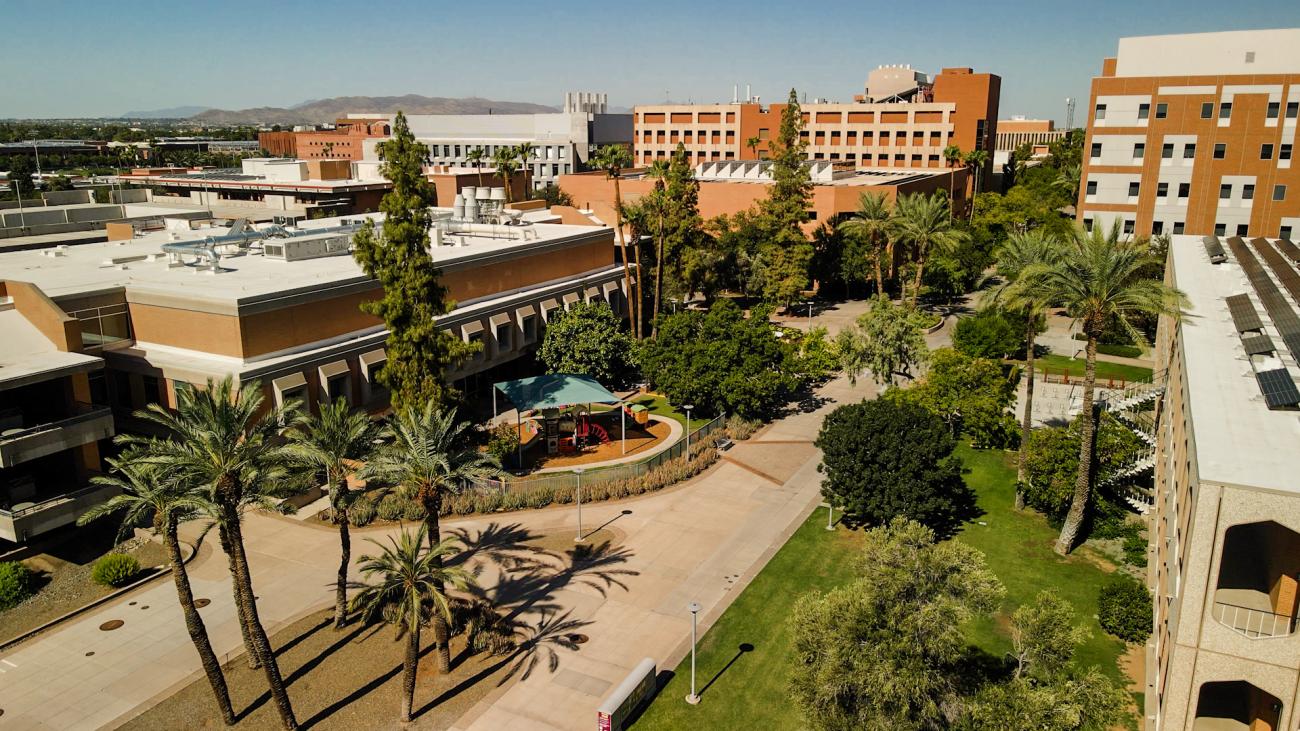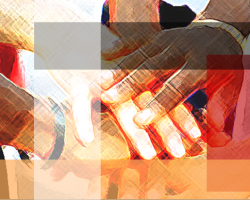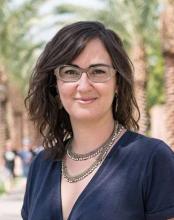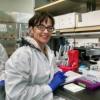
The Cooperation Lab (Aktipis)

Overview
How do we navigate the fundamental tensions between cooperation and conflict that are inherent to social living? The Cooperation and Conflict Lab investigates these process across a variety of systems, from humans food sharing to cooperation in multicellularity and cancer. We use diverse methods including computation modeling, human subjects experiments and fieldwork to explore the decision rules and fundamental principles that shape cooperation across systems.
Sociality is a tricky business. On one hand it offers important opportunities for mutual benefit, and on the other hand it can present threats from cheaters and competitors. This fundamental tension between the benefits and costs of social living is the focus of the Cooperation and Conflict Lab. From models of the evolution of cooperation to analyses of reproductive competition, we explore how the tension between cooperation and competition has shaped sociality across many different systems.
Research Projects
The Human Generosity Project. The Human Generosity Project is a large-scale transdisciplinary research project to investigate the inter-relationship between biological and cultural influences on human cooperation. Funded in part by The National Institutes of Health and The Sir John Templeton Foundation, this project fuses multiple methodologies to understand the nature and evolution of human cooperation including fieldwork, laboratory experiments and computational modeling.
What decision rules underlie cooperation?
- How does the ability to leave uncooperative partners and groups shape the viability of cooperation?
- Is sharing based on the need of the recipient (i.e., need-based transfers) part of the human behavioral repertoire?
- How is cheating detected and suppressed as cooperation scales-up from individual interactions to large networks?
- How do humans navigate relationships that are characterized by both cooperation and conflict?
- Do humans use flexible kinship concepts (e.g., thinking about a friend as “like family”) to identify relationships characterized by positive fitness interdependence?
How can cooperation theory help us understand human health and disease?
- Is cancer initiation characterized by a breakdown in the foundations of multicellular cooperation?
- Do cancer cells and cell colonies evolve based on the same principles of social evolution that apply to humans and other free-living organisms?
- Are there tradeoffs between reproductive competitiveness and cancer defenses?
- Does cooperation and conflict between humans and our microbes shape our eating preferences and social behavior?
The Microbiome and Behavior Project. Our microbial inhabitants play important roles in shaping human health, from metabolic disease to depression and anxiety. The Aktipis Lab studies the role of microbes in human behavior as well as the nature of microbe-host interactions. Our current research investigates the role of the oral and gut microbiomes in shaping eating behavior through studies with human subjects. We also apply the frameworks of genetic conflict and cooperation theory in order to better understand the complex interactions between us and our microbiota and the evolutionary pressures that have shaped these interactions. Broadly, the goal of the Microbiome and Behavior Project in the Aktipis Lab is to uncover the fundamental principles shaping host-microbiome interactions and the explore the implications for human eating behavior, social behavior and general well-being.
Current Microbiome and Behavior Project studies include:
- Microbial Manipulators and Eating. Our ongoing studies focus on two conditions with profoundly negative implications for human health and wellbeing: obesity and restrictive eating disorders. Using genetic analysis of samples from human gut and oral cavities, in combination with experimental and survey data, we test mechanisms for microbiota involvement in the aberrant eating behavior underlying these disorders.
- Microbiome Modulators and Stress. Components of the gut microbiome respond to and affect the response of the host to stressors. Exposure to chronic stress is unequally distributed across populations, as poor communities are subject to higher levels of social and economic stress and are more likely than higher income individuals to live in locations that risk exposure to environmental toxins. Within populations, exposure to acutely stressful events in early life impacts later resilience. Our work focuses on integrating the gut microbiome as a moderator of mental health functioning, and in recovery from acute stress exposure during trauma.
- Food Vectors: Meals. Social contact offers opportunities for the exchange of beneficial commensal microorganisms, as well as the possibility for pathogen exposure. In humans, our unique practice of widely sharing food and consuming shared food together provide an important mode of microbe transmission. We are collecting experimental data about whether food and non-food sharing and commensality (meals) affect subsequent social interactions differently.
The research director for the Microbiome and Behavior Project is Dr. Helen Wasielewski, post-doctoral research fellow with principal investigator and lab director, Dr. Athena Aktipis. Additional members of the project's scientific team include Joe Alcock, MD (Univ of New Mexico); Rosa Krajmalnik-Brown, PhD (ASU Swette Center for Environmental Biotechnology (SCEB)); Juan Maldonado, PhD (SCEB); Carlo Maley, PhD (ASU SoLS and Biodesign); Naomi Mandel, PhD (ASU W.P. Carey School of Business); Marisol Perez, PhD (ASU Department of Psychology); Sarah Hill, PhD (Texas Christian University); and Jaimie Krems (Oklahoma State University Department of Psychology).
Lab Director & Principal Investigator: Athena Aktipis, PhD, Assistant Professor
Athena Aktipis is an Assistant Professor in the Psychology Department at Arizona State University, co-Director of the Human Generosity Project and Director of Human and Social Evolution and co-founder of the Center for Evolution and Cancer at the University of California, San Francisco. Dr. Aktipis completed her BA at Reed College (Psychology), her PhD at University of Pennsylvania (Psychology) and post-doctoral work at University of Arizona (Ecology and Evolutionary Biology). She is a cooperation theorist, theoretical evolutionary biologist, and cancer biologist who now works at the intersection of these fields. Dr. Aktipis is the author of the forthcoming book from Princeton University Press "Evolution in the flesh: Cancer and the transformation of life." Curriculum Vitae. For more information about Dr. Aktipis, please visit her website.
Graduate Students
Jessica Ayers, Doctoral Student, Social Psychology, Department of Psychology.
Jessica obtained her bachelor’s degrees in psychology and anthropology and her master’s degree in experimental psychology from California State University, Fullerton. She is broadly interested in evolutionary approaches to women’s social behavior with an emphasis on investigating factors that lead to women’s intrasexual cooperation and competition. Specifically, Jessica is interested in studying the influence of competitive motives at different points during a woman’s life as well as the situational influences that differentiate when women may compete or cooperate with same-sex peers.
Andrés Muñoz, Doctoral Student, Social Psychology, Department of Psychology.
Andres is a Graduate Student Researcher in the Department of Psychology at Arizona State University. He obtained his bachelor’s degree with a major in psychology and a minor in political science from DePauw University. He is broadly interested in integrating an evolutionary framework with cognitive science methodologies to address questions about human social cognition and behavior. Specifically, Andres is investigating the cognitive mechanisms underlying cooperation, rule breaking, and risk management.
Diego Guevara Beltran, Doctoral Student, Social Psychology, Department of Psychology. Diego received his bachelor’s degrees in psychology and evolutionary anthropology from the University of New Mexico. He is interested in employing the frameworks of behavioral ecology and evolutionary psychology to understand the role of emotions, personality, and dispositional factors on cooperative behavior and how the expression of these traits may change as a function of the environment. Specifically, he is interested in collecting data from social laboratory experiments to understand dispositional differences in empathy and its influence on prosociality.
Alumni

 Amy Boddy, PhD, Post-doctoral Fellow
Amy Boddy, PhD, Post-doctoral Fellow
Dr. Boddy has a PhD in Molecular Biology and Genetics from Wayne State University, School of Medicine. Dr. Boddy works on the applications of life history evolution to cancer. This includes both cellular evolution in neoplams and the role of life history evolution in cancer suppression.
Marco Campenni, PhD, Post-doctoral Fellow
Dr. Campenni is a post-doctoral researcher on the Human Generosity Project in the Aktipis lab. He received his Ph.D. in Cognitive Sciences from the University Tor Vergata, Rome, Italy. His work is centered on modeling the evolution of cooperative behavior, using different modeling techniques and tools (agent-based modeling, evolutionary game theory, GIS data). His research activity is focused on both theoretical and data informed models of social behaviors and dynamics of animals from an evolutionary and cross-species perspective.
Daniel Sznycer, PhD, Post-doctoral Fellow
Dr. Sznycer received his PhD from University of California, Santa Barbara and is an evolutionary psychologist conducting research on the psychology of sociality. He combines methods, theories, and concepts drawn from the cognitive sciences and evolutionary biology to explore and map the evolved design of social emotions and their underlying motivational systems. He has multiple lines of cross-cultural evidence on shame, pride,compassion, and envy, and their roles in altruism, cooperation, social exclusion, and conflict. The methods he uses include experimental economic games, decision-making tasks, priming methods, cross-cultural and ethnographic data collection, large-scale representative surveys, and Anthropometry.
Helen Wasielewski, PhD, Post-doctoral Fellow
Dr. Wasielewski earned her PhD in Evolutionary Anthropology from Rutgers University and works on understanding the relationships between human gut microbiota and eating behavior. She specializes in using laboratory experiments to understand food choice and intake given the evolutionary interests of gastrointestinal endosymbionts and their human hosts. Her work focuses on understanding the health implications of the bidirectional relationships between gut microbiota and behavioral variables including dietary intake, eating behavior, and social transmission. Dr. Wasielewski’s orientation to these topics is informed by work in evolutionary biology, non-human primate social behavior, and hominin evolution.
Research Affiliates
Angelo Fortunato, PhD, Research Scientist
Dr. Fortunato received his PhD in Ecology and Evolutionary Biology from Rice University, Houston, Texas, and a second PhD in Experimental and Clinical Oncology, from University of Florence, Italy. He was Visiting Scholar at Rice University, Contract Researcher at the Institute Jacques Monod, Paris, France, Research Associate at The Welcome Trust Sanger Institute, Hinxton, Cambridge, UK, Postdoctoral Fellow at the Department of Neuroscience, University of Siena, Italy, Postdoctoral Researcher and Adjunct Faculty at the Department of Experimental and Clinical Medicine, and at the Department of Experimental and Clinical Biomedical Sciences, University of Florence, Italy and Associate Specialist at University California, San Francisco, CA, USA. His research focuses on molecular genetics, cancer biology, evolutionary biology and cancer evolution.
Alex May, M.Sc., Research Technologist
Alex is an evolutionary biologist with an interest in examining the emergence of cooperation and how it can break down across multiple systems, including microbes, plants, and cancer. His previous work included elucidating the role of cheating bacterial symbionts in the rhizobia-legume mutualism, examining the benefits of multicellularity in cancer cell clusters via artificial selection, and is currently developing the fermented drink ‘Kombucha’ as a model of social behavior in yeast and bacteria.He received his B.Sc. of Biology from McMaster University in Canada, and his M.Sc. in Ecology and Evolution from the Free University of Amsterdam in the Netherlands.
Laboratory Staff
Cristina Baciu, B.S., Project Manager
Cristina received a bachelor’s degree in finance and accounting, in Bucharest, Romania, where then she worked as an accountant and guest relations manager for a luxury boutique hotel. Recently, Cristina obtained her second bachelor’s degree with a major in psychology and minor in business from Illinois Institute of Technology. Beside her work on the Human Generosity Project, Cristina is also an Administrative Advisor for the Collaborative Replication and Education Project, as well an Ambassador for Center for Open Science. She is interested in open science practices, cross-cultural cooperative behavior, and law psychology.
Pamela Winfrey, M.A., Scientific Research Curator
Pamela explores the relationship between the arts, the humanities, and the sciences by curating and creating artworks, experiences, and exhibitions. Her background is in new media, performance, and installation art and she is also a working playwright and screen writer.
Undergrad Research Assistants
Yuqian Huang, Jennifer Inzunza, Jessica Kratzert, Jessica Van Hoff
JOIN THE LAB!
Undergraduate Research Opportunities
Are you a Psychology major interested in research experience? The Cooperation and Conflict Lab has several openings for undergraduate research assistants for course credit.
Qualifications: The lab is searching for enthusiastic, reliable and highly motivated Undergraduate Research Assistants. Coursework in Research Methods is preferred but not required.
Undergraduate Research Assistants (RAs) are typically involved in: participant recruitment and scheduling; running experiments; collecting data from computational models; participating in lab meetings and research discussions; and assisting with data entry, management and analysis. Some of the benefits of the RA experience in the Cooperation and Conflict Lab include:
- Learning how to run laboratory experiments and the basics of computational modeling;
- Gaining an understanding of the benefits of interdisciplinary research using multiple methodologies
- Finding out more about what grad school is like and whether or not it is right for you
- Developing a relationship with a professor who will write a letter of recommendation for your graduate school applications
- Getting course credit for PSY 399 or PSY 499
For more information about joining the lab as an Undergrad RA contact Dr. Aktipis or visit our Undergraduate Research Opportunities webpage.
Doctoral opportunities
Doctoral students: The Cooperation and Conflict Lab is currently accepting applications from interested doctoral students. Please contact Dr. Aktipis for more information.
Select Publications
Below are a sample of recent publications from Dr. Aktipis' research. A more complete listing may be found in her curriculum vitae or by visiting Google Scholar.
2019
Whisner, C. M., & Aktipis, A. (2019). The role of the microbiome in cancer initiation and progression: How microbes and cancer cells utilize excess energy and promote one another’s growth. Current Nutrition Reports, 1-10.
Fortunato, A., & **Aktipis, A. (2019). Social feeding behavior of Trichoplax adhaerens. Frontiers in Ecology and Evolution, 7, 19.
2018
Aktipis, A., Cronk, L., Sznycer, D., Alcock, J., Ayers, J., Baciu, C., Balliet, D., Boddy, A., Curry, O., Krems, J., Munoz, A., Sullivan, D., Wilkinson, G., Winfrey, P. (2018). Understanding cooperation through fitness interdependence. Nature Human Behavior, 2, 429:431
Cronk, L. & Aktipis, A. (2018). Sacredness as an implied threat of supernatural punishment: the case of need-based transfers, Religion, Brain & Behavior, 8:3, 282-285
2017
Aktipis, A. & Maley, C. (2017). Cooperation and cheating as innovation: Insights from cellular societies.Philosophical Transactions of the Royal Society B: Biological Sciences, 372(1735), 20160421.
Fortunato, A., Boddy, A., Mallo, D., Aktipis, A., Maley, C. C., & Pepper, J. W. (2017). Natural Selection in Cancer Biology: From Molecular Snowflakes to Trait Hallmarks. Cold Spring Harbor Perspectives in Medicine, 7(2), a029652.
2016
Alcock, J., Wasielewski, H., Aktipis C. A. (2016). Resource conflict and cooperation between human host and gut microbiota: implications for nutrition and health. Annals of the New York Academy of Sciences, 1372: 20–28 DOI: 10.1111/nyas.13118
Aktipis, C.A., Cronk, L., De Aguilar, R (2016). Cooperation in an uncertain world: For the Maasai of East Africa need-based transfers outperform account keeping in volatile environments. Human Ecology, 44(3): 353–364
Aktipis, A. (2016), Principles of cooperation across systems: from human sharing to multicellularity and cancer. Evolutionary Applications, 9:17–36. DOI: 10.1111/eva.1230
2015
Hao, Y., Armbruster, D., Cronk, L., & Aktipis, C. A. (2015). Need-based transfers on a network: a model of risk-pooling in ecologically volatile environments. Evolution and Human Behavior, 36(4),265-273.
Boddy, A. M., Fortunato, A., Wilson Sayres, M. and Aktipis, A. (2015), Fetal microchimerism and maternal health: A review and evolutionary analysis of cooperation and conflict beyond the womb. Bioessays, 37: 1106–1118. doi: 10.1002/bies.201500059
Aktipis, C. A., Boddy, A., Jansen, G., Hochberg, M., Maley, C., Hibner, U., Wilkinson, G. (2015). Cancer across life: Cooperation and cheating in multicellularity. Philosophical Transactions of the Royal Society B. Published online June 8 DOI: 10.1098/rstb.2014.0219
Boddy, A., Kokko, H., Breden, F., Wilkinson, G. Aktipis, C. A., (2015). Cancer susceptibility and reproductive tradeoffs: A model of the evolution of cancer defenses. Philosophical Transactions of the Royal Society B. Published online June 8 DOI: 10.1098/rstb.2014.0220
Brown, J., Aktipis, C.A., Inclusive fitness effects can select for cancer suppression into old age. Philosophical Transactions of the Royal Society B. Published online June 8.DOI: 10.1098/rstb.2015.0160
Jansen, G., Gatenby, B., Aktipis, C.A. (2015). Control vs. eradication: Adopting strategies from infectious disease treatment to cancer. Proceedings of the National Academy of Sciences of the United States of America 112.4 937.
2014
Hao, Y., Cronk L., Armbruster, D., Aktipis, C.A. (2014). Need-based transfers on a network: A model of risk-pooling in ecologically volatile Environments
Alcock, J., Maley, C.C., Aktipis, C.A. (2014). Is eating behavior manipulated by the gastrointestinal microbiota? Evolutionary pressures and potential mechanisms. Bioessays. Online publication 8/7/14
2013 and earlier
Aktipis, C. A., Boddy, A., Brown, J., Gatenby, R, Maley C. C. (2013). Life history tradeoffs in cancer evolution. Nature Reviews Cancer, 13, 883-892.
Aktipis, C.A., Nesse, R. (2013). Evolutionary foundations for cancer biology. Evolutionary Applications. 6(1) 144-159.
Aktipis, C.A. (2011). Is cooperation viable in mobile organisms? Simple Walk Away strategy favors the evolution of cooperation in groups. Evolution and Human Behavior 32(4) 263-276.
Aktipis, C. A., Cronk, L., De Aguilar, R. (2011). Risk-pooling and herd survival: An agent-based model of a Maasai gift-giving system. Human Ecology 39(2) 131-140.
Aktipis, C.A. 2004. Know when to walk away: Contingent movement and the evolution of cooperation. Journal of Theoretical Biology. 231(2), 249-260.
In the News!
Dr. Aktipis is featured in the Phoenix Magazine The Cactus Cure (posted 15 April 2019)

The Human Generosity Project is featured in the Sapiens Magazine Is a More Generous Society Possible? (posted 21 February 2019)

Cooperation & Conflict Lab is featured in ASU Now Zombie Narratives Can chew Through Complex Topics (posted 18 October 2018)

Dr. Aktipis is featured in the Harvard Gazette Before Cancer Kills, It Cheats (posted 5 March 2018)

 Do human and vampire bat friendships share the same origin? Human Generosity Project members are interviewed about their research for an article in Sapiens (posted 1 Sep 2016).
Do human and vampire bat friendships share the same origin? Human Generosity Project members are interviewed about their research for an article in Sapiens (posted 1 Sep 2016).

Cooperation & Conflict Lab postdoc Dr. Helen Wasielewski receives travel grant from The National Academy of Sciences to attend workshop: Microbiomes of the Built Environment: From Research to Application at UC Irvine, Oct. 17-18, 2016

New Scientist. The kindness paradox: Why be generous? Humans are one of the rare animals to be altruistic. “In every society we’re studying, we have found need-based transfers,” says Human Generosity Project co-director Athena Aktipis. Learn more about the Maasai tradition of osotua and the generosity of amongst herders in asking for help (posted 10 Aug 2016).

From the Biodesign Institute news page: War and peace in the human gut: probing the microbiome
(posted 6 June 2016).

 Dr. Aktipis interviewed on The Daily Dot about "The unexpected perks of Lyft and Uber’s random encounters - the future of Ride - Hailing" and how ride sharing taps into our generous nature as humans (May 11, 2016).
Dr. Aktipis interviewed on The Daily Dot about "The unexpected perks of Lyft and Uber’s random encounters - the future of Ride - Hailing" and how ride sharing taps into our generous nature as humans (May 11, 2016).

 Understanding why we lend a hand. Why help someone when you’ll receive nothing in return? How have groups of people cooperating together ensured group survival? These questions lie at the roots of Athena Aktipis' work. The ASU psychology professor is co-director of the Human Generosity Project, an interdisciplinary research project that examines subjects like how generosity can help humans get through natural disasters. ASU Now, Jan 27, 2016.
Understanding why we lend a hand. Why help someone when you’ll receive nothing in return? How have groups of people cooperating together ensured group survival? These questions lie at the roots of Athena Aktipis' work. The ASU psychology professor is co-director of the Human Generosity Project, an interdisciplinary research project that examines subjects like how generosity can help humans get through natural disasters. ASU Now, Jan 27, 2016.
Why Being a Good Neighbor is a Good Idea. Researchers look to Southwestern ranchers to learn why we share — and what happens when we don’t. High Country News, Dec 7, 2015.

 Microchimerism Review
Microchimerism Review
New York Times, Sep 10, 2015: Pregnancy Souvenir: Cells That Are Not Your Own
National Geographic, Sep 7, 2015: Foetal Cells Hide Out in Mum’s Body, But What Do They Do?
Smithsonian Magazine, Sep 2, 2015: Baby’s Cells Can Manipulate Mom’s Body for Decades; and a fun video abstract on YouTube
Fetal cells influence mom during, after pregnancy. New ASU research has shown that during pregnancy, cells of the fetus often migrate through the placenta, taking up residence in many areas of the mother's body. In some cases they benefit the mom; in others they are a detriment to her health. And their effects can show up years or decades later. The research could lead to a transformation in the way we approach, treat and prevent a variety of diseases that affect women. ASU News, Aug 13, 2015.
KJZZ The Show. Sep 8, 2015. Interview with Dr. Amy Boddy, ASU research: Fetal cells may affect mother years after birth.

 From the Cancer Cooperation Project, the New York Times published this 27July 2015 article based on Cancer across the tree of life: cooperation and cheating in multicellularity.
From the Cancer Cooperation Project, the New York Times published this 27July 2015 article based on Cancer across the tree of life: cooperation and cheating in multicellularity.
New study describes cancer's cheating ways. In some ways, cancer cells are like selfish people: They focus on their own goals, at the expense of the greater good. That's one way to summarize a study that included Athena Aktipis, an ASU researcher. The study explored how cancers can bypass life forms' protective mechanisms - and better understanding the nature of cancer means being better equipped to fight it. ASU News, 6/8/2015.










